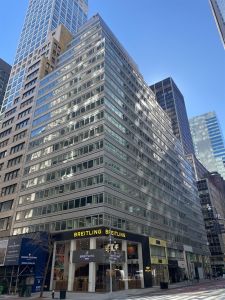Dispute Between Partners Could Force Swig Out at 48 Wall Street: Lawsuit
By Daniel Geiger March 7, 2012 2:47 pm
reprintsReal estate investor M. Myers Mermel has filed a suit against the embattled landlord Kent Swig to try to force Mr. Swig out of one of his last remaning office buildings, 48 Wall Street.
The case, which is in state Supreme Court, alleges that Mr. Swig violated an operating agreement between partners at the property by pledging his assets as collateral in a $116 million judgment against him late last year to satisfy his long list of creditors.
 Mr. Swig has been the target of several litigation cases in recent years seeking to reclaim tens of millions of dollars he owes to partners and lenders, the fallout from the spectacular collapse of his real estate empire in the city during the recession.
Mr. Swig has been the target of several litigation cases in recent years seeking to reclaim tens of millions of dollars he owes to partners and lenders, the fallout from the spectacular collapse of his real estate empire in the city during the recession.
“The defendant will be deemed to have withdrawn as managing member of the company upon his making of “any assignment for the benefit of [his] creditors with respect to substantially all of [his] assets,” the suit states.
Mr. Mermel owns a minority interest in 48 Wall Street, a roughly 320,000 square-foot-office building in lower Manhattan. Mr. Swig and a partner at the property, the investment group MacDonald & Cie, hold the majority stake. Mr. Swig is the operating partner of the 34-story property, a position that places him in charge of leasing and management of the building.
Through the suit, Mr. Mermel is seeking to force Mr. Swig to accept a buyout offer and replace him as the building’s operator, which would put Mr. Mermel at the helm of leasing and award him the fees from the building’s partners that the leasing agency generates.
In the suit, Mr. Mermel accuses Mr. Swig of having no incentive to perform his management role at 48 Wall Street, since the proceeds he earns will go to his creditors.
“A central purpose of the operating agreement’s provision for the involuntary withdrawal of a managing member who has assigned all of his property for the benefit of creditors is that a judgment proof managing member has no means for paying any liabilities arising from his mismanagement of the company,” the suit states. “This immediately and severely threatens the interests of the plaintiff.”
Mr. Mermel’s case alleges that the situation at 48 Wall Street is already awry and that he received a letter in November 2011, the month the case was launched, requesting a $1.25 million capital call, a sign Mr. Mermel took as an indication of the building’s “deteriorating capital condition under defendant’s management.”
Reached in his office, Mr. Mermel declined to comment on the suit.
Kirk MacDonald, a principal of MacDonald & Cie, contested its allegations and said that his company, which invests European money into real estate, was countering by making Mr. Mermel an offer to buy him out.
“We’re offering him a price that is much higher than what the building is presently worth, but we believe in the future value of the property,” Mr. MacDonald said, who said the building was worth about $60 million, on par with the mortgage it carries with lender Capital One. “We’re still in a dip in values right now, particularly downtown, but in the coming years, this property is going to rise substantially.”
Mr. MacDonald said that he controlled the majority of the equity in the property and that Mr. Swig was his partner. He said the building was on strong financial footing. If he recapitalized 48 Wall Street, Mr. MacDonald said that he would keep Mr. Swig as his operating partner in the building.
“Mr. Swig has been an excellent partner,” Mr. MacDonald said. “If he wasn’t doing a great job with leasing and management, he wouldn’t still be handling it.”
Recent leasing at the property appears to show that Mr. Swig has been successful in drawing tenants.
In January, a company called Situs Holdings signed a 13,650-square-foot deal for the building’s entire 14th floor for rents in the $30s per square foot. The firm is a real estate adviser. Jonathan Dean, a leasing broker who works for Mr. Swig, said at the time he was working on filling the building’s few remaining vacancies, the eighth and ninth floors, which he said had activity.
“Myers Mermel’s claims are wholly without merit as he seeks to take advantage, for his own personal gain, of a situation in which he is ignorant of the facts and circumstances of his claim,” a spokesman for Mr. Swig wrote in an email response to The Commercial Observer. “After allowing Mr. Mermel to convert his brokerage fee into a diminimous equity position at the closing of the purchase of 48 Wall in March of 1998, his actions are disappointing and unworthy of further comment.”
Dgeiger@observer.com


